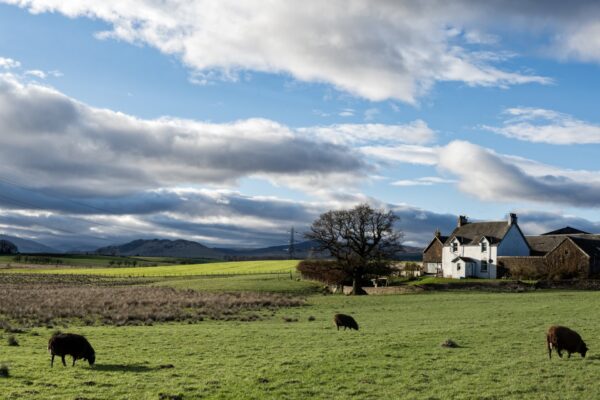
A woman’s experience of male sexual entitlement in rural Scotland
Of Lovers and Livestock
Stacey MacDonald shares her experience of male sexual entitlement, growing up in rural Scotland.
Content warning for mentions of sexual violence.
At the exact moment I got the call to write this piece I was in hospital waiting to have a very simple procedure done as a day case, under anaesthetic. The procedure didn’t require anaesthetic but, sadly, I couldn’t tolerate it conscious.
It’s a consequence of having been sexually assaulted 24 times during my life. That includes being raped. Being forced to lie still on a hospital trolley, with on-looking chaperones, totally exposed, triggers me into a primeval survival response.
Police Scotland crime statistics show that rape and attempted rape only account for around 18% of all sexual crimes. This means that unwanted touching or repeated harassment might make up a significant number of sexual crimes. I wonder if this is because men don’t even realise what they are doing is criminal?
When I count the number of sexual assaults I have been the victim of, I’m not including the times I’ve had my bum pinched in a crowd or any of the unwanted “compliments” I’ve had passing a group of men alone. I don’t believe these men enjoy making me uncomfortable, I’m guessing that maybe they want to get my attention and make me feel appreciated. But the sheer relentlessness of this behaviour is not understood by men.
I recently chatted to some male friends about this so I could get their perspectives. They were shocked to find that I had experienced so much violence and harassment. I asked them about the Don’t Be That Guy campaign and if they would check their friends about their behaviour?
One told me “Men who don’t behave like that don’t have friends who would. Those kinds of men all stick together, and I have no friends I need to speak to.”
I disagreed.
I happen to know that this person had several friends who have crossed the line, not only with me, but with some of my family members and many of my friends.
The problem is that the position of the line is not understood. For many men, their image of a sexual attack is a lone woman, walking a dark empty street, and a stranger commits the crime.
When it comes to sexual violence, in reality, the perpetrator is someone far more familiar. Around 70% of victims report that a partner or someone they knew attacked them. I’m not alone in my experiences.
The Scottish Government found a third of respondents to their annual crime and justice survey who reported being victims of sexual violence had “lost count” of the number of assaults they’d experienced. And about 68% of all women have been victim of one or more sexual harassments.

Women are not giving out “mixed signals”, they are trying to find partners whilst wading through a sea of men who cross the line. For some women, every man is a potential threat. If she suddenly ghosts you, either you’ve already crossed the line, or she thinks you might.
Attitudes are where it all begins. There’s a wealth of academic research that shows thinking women are inferior to men, and that you’re entitled to sex, significantly increases your risk of committing serious sexual violence. Sadly, some women pay for these male attitudes with their lives.
Objectifying and “othering” women, that is, treating some women completely differently to others, is common amongst those driven by male sexual entitlement. As a young woman exploring adulthood in the rural area where I’m from, I drew a direct comparison between these attitudes and some men’s attitudes towards livestock.
Growing up in rural Scotland, there was a culture of hard men who, having handed “The Ball and Chain” her housekeeping money, went straight from their tough manual jobs to the pub. Responding to her requests and needs meant you were “under the thumb” or “whipped”. Spending a day out with wifey and your kids was done under sufferance and made you a “softie”.
These same hard men were the ones who would follow me to the place most assaults happened – the corridor between the bar and the toilets; dim, narrow, unseen. What would happen there wouldn’t be done in front of others, in case someone mentioned it to a male family member of mine.
Assailants would assume that a male from my family would be enraged by one of his ‘herd’ being harmed. Despite often being dreadful to their own female family members, fathers, brothers, uncles, cousins wouldn’t let anyone else do the same. The females were owned by the men of the family.
On some occasions I was assaulted in full view of community members. I believe the assault that causes my greatest reaction to basic medical procedures, was the time two of my friends’ fathers saw 17-year-old me being chased, screaming, into a wood at night. I saw them turn, silhouetted in the streetlights, and watch. I thought I might be saved, but they paused, only briefly, before turning their backs and walking. There was a ‘none of my business’ culture that enabled all that happened that night.

You’ll all know someone who has been sexually assaulted, they might just not have felt safe enough to disclose to you. And if you don’t have perpetrators on your friends list, you probably know men who have walked away and pretended not to see one.
Unsurprisingly I didn’t commit to a partnership with any of these men. My eyes were opened to my options when I experienced other cultures, most of all when I saw manly men defined by those who would never expect their friend to socialise without his wife (it’s his best friend after all).
Cultures where marriage is prized and that celebrate wedding anniversaries as a community. Men whose status was raised by being a family man; not just providing a housekeeping budget for the home, but those who got involved in the day to day grind of family life. Let me tell you, a man like that is HOT. So Hot.
His looks, his build, his car, are neither here nor there to me, but if he can walk proudly into a room with me, enjoy my time, my attention, and give me his, then that’s it. I’m all in for ever more, and quite honestly so is every woman I know.
It’s easy to think that weird things go on in small places, and what I’ve described is isolated, or from another era. But the reporting of sex crimes in Scotland has increased over 100% in the decade 2010-2019. Other crimes have fallen, yet reporting of rape is the highest since 1971.
A large EU study of students showed that 73% had experienced sexual violence during their short lifetimes. Alcohol and drugs were contributors, blurring consent and reducing inhibitions.
However, only seven per cent of the Scottish Government crime and justice survey respondents claim their attacks were from going on a date, and 40% of the victims were under 18 years of age. This suggests that vulnerability is being mined by men.
“Why?” I asked my male friends. One suggested that he thinks men don’t want to hear “no” and so don’t ask for consent. So there are men who find that committing a sex crime on a vulnerable person is better than rejection – let that sink in.
When did men become so precious? How have we managed, in recent times, to make boys and men believe that avoiding rejection is better than being locked up for seven years?
Sure, back in the Sean Connery-style Bond days we were telling men that asking permission is weak, a man takes what he wants, because a woman doesn’t realise what she wants. If you impress it upon her she will thank you eventually. Do we still do that now? Where are we doing it?
I was standing in the playground at a school fete when I realised a possible answer; we don’t let boys be miserable. We mitigate everything for them. Didn’t win the match? Didn’t get a prize? Didn’t get the answer right? OK, well someone will make it up to you with an ice cream, or toy, or by agreeing that it was unfair and you really deserved it.
I’ve observed this attitude myself, but the danger is when we feed that to boys along with the patriarchal ideals of success and failure, we create a huge sense of entitlement. Instead of building resilience, and a caring attitude, we create angry young men outraged because they’re not getting the attention they think they deserve.
We can get better at this. We can do more, be more. We have one of the most progressive societies in so many other ways. Men lead much of that progressive thinking. So why not lead on improving men’s attitudes to women? There’s simply nothing to lose and so much to gain from functional relationships and less crime.
A culture driven by male entitlement costs money; the NHS, the psychological services, the criminal justice system, all cost money as they rectify this damage. We need to look at the roots, the attitudes, the patriarchy, the parenting styles, and we need to look at ourselves and our peers.
If you have a friend who is angry with women, has constant one-nighters, is using substances heavily, is watching porn daily, has physically harmed a woman, controls his partner or other female family members, or says that you should be controlling yours, then he’s That Guy.
He’s the one you need to take aside because the studies show he’s at risk of committing a crime. Explain to him that it’s not an attitude that’s fit for purpose.
Feminist literature is a great place to start looking for the information you’ll want to hand for that difficult conversation. But, most importantly, being a living example of a real man, who loves his wife and his family.
It’s always going to be the clearest way to get the message across.
SUPPORT
You can find advice and information on the Police Scotland website
Call Police Scotland on 101 or contact the Rape Crisis Scotland national helpline for free on 08088 01 03 02 (daily 5pm-12 midnight).
In an emergency always call 999.
